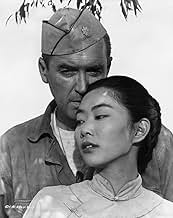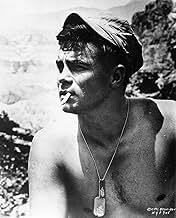Adicionar um enredo no seu idiomaA US Army Major stationed in East China in 1944 is ordered to blow up military installations in order to slow down the advancing Japanese Army.A US Army Major stationed in East China in 1944 is ordered to blow up military installations in order to slow down the advancing Japanese Army.A US Army Major stationed in East China in 1944 is ordered to blow up military installations in order to slow down the advancing Japanese Army.
- Sgt. 'Mike' Michaelson
- (as Henry 'Harry' Morgan)
- Bit Role
- (não creditado)
- Chinese Captain
- (não creditado)
- Bit Role
- (não creditado)
- Direção
- Roteiristas
- Elenco e equipe completos
- Produção, bilheteria e muito mais no IMDbPro
Avaliações em destaque
Unfortunately, as the group never comes into contact with the Japanese and is never in serious danger, we don't feel a lot of tension. Whatever threat there is comes from the Chinese themselves, from mobs of starving peasants to bands of wayward deserting marauders.
The most interesting feature of the film deals with the difference of customs. The pomp and ceremony important to Chinese is alien to the Americans just wanting to get down to the business at hand. Looking from different points of view, each side views the other as somewhat barbarous and inhumane and as a result never quite reach the level of friendship each would have.
Although Jerome Morass provides a spirited music score, it doesn't quite fit in with the action, or rather the lack of it. With an exception or two, the events on the screen just never generate much pathos, resulting in a not so poignant anti-war film.
Stewart, as always, is worth watching, Lisa Lu has charm, and Harry Morgan gives a preview of what would become his Colonel Potter M*A*S*H* character.
The film shows the challenges of military command and conflicts that the lead character, Major Baldwin has. James Stewart plays that part very well. His conflicts are different in that most of his decisions about blowing up bridges, roads and even buildings in villages affect hundreds of civilians.
All of the cast are very good in their roles. Among the most prominent are Lisa Lu who plays Madame Sue-Mei Hung, Harry Morgan who plays Staff Sgt. Mike Michaelson and Glenn Corbett who plays Collins.
An interesting aspect of this film is that there are no Japanese soldiers. The Americans never encounter the enemy. The film depicts some of the aspects of the Chinese culture that Major Baldwin had not yet learned. The terrain looked like it could have been filmed in China, but was mostly rugged hilly country and mountains in Arizona.
The film has some impressive scenes of explosions. Some consider it an anti-war film, and it fits that mold of most war movies that show the horrors, death, destruction and insanity of war.
It's a good film, but not great. War film buffs and those who enjoy history should enjoy it. Others, especially modern audiences used to fast and furious entertainment, may find it hard to sit through.
The best line in the film is from Alan Baxter who plays Gen. Loomis. After Stewart's character tells him that he had asked for the command, Loomis says, "You know what command is, major?" Maj. Baldwin replies, "Well, sir, the book says... " And Gen. Loomis says, "Command is power. Pure, simple, unlimited."
Stewarts characters struggle with power and his obsession to accomplish his objective was fun to watch. This film is worth the time spent and includes some great character actors of this period. I think it deserves its 6.6 overall rating.
Watching this movie develop reminded me of recent events in europe and made the film seem timely despite its age.
Você sabia?
- CuriosidadesThe film includes themes considered to be taboo for Hollywood during the war years, such as tensions between allies and racism among Americans.
- Erros de gravaçãoWhen Baldwin and his unit arrive at the ammunition dump they're supposed to blow up, it consists of several small buildings and shacks. But the interior shots showing mountains of ammunition have no resemblance to the buildings they're supposed to be in: two of them are clearly gigantic tunnels ten or twenty times as long as the buildings that are supposedly being inspected.
- Citações
Major Baldwin: Colonel, I'm gonna blow up this road. Now, how can we keep the people off?
Col. Kwan: Off?
Major Baldwin: Well, I-I, I need them stopped for about ten minutes. Can you do it?
Col. Kwan: How?
Major Baldwin: Well, uh, how 'bout, uh, how 'bout if we get a couple of empty gasoline drums, put 'em on either side of the road, stretch a rope across.
Col. Kwan: They'd go under the rope.
Major Baldwin: Well, then we get some Chinese soldiers to explain to them, explain to them that we're cutting the road. How 'bout that?
Col. Kwan: The soldiers will want to get through themselves.
Major Baldwin: Well, could we give them something?
Col. Kwan: What?
Major Baldwin: Well, money?
Col. Kwan: They cannot spend money here.
Major Baldwin: Well, food. How 'bout food? We got 'K' rations, cigarettes. How about cigarettes? What'll they take for the job?
[Kwan Says something in Chinese]
Major Baldwin: [Angrily] I don't speak Chinese, Colonel.
Col. Kwan: There is no way.
- ConexõesFeatured in Hollywood Chinese (2007)
Principais escolhas
- How long is The Mountain Road?Fornecido pela Alexa
Detalhes
- Data de lançamento
- País de origem
- Idiomas
- Também conhecido como
- El camino del odio
- Locações de filme
- Stewart Mt. Roads, Salt River Canyon, Arizona, EUA(refugee road sceens)
- Empresa de produção
- Consulte mais créditos da empresa na IMDbPro
- Tempo de duração1 hora 42 minutos
- Cor
- Proporção
- 1.85 : 1
Contribua para esta página


































